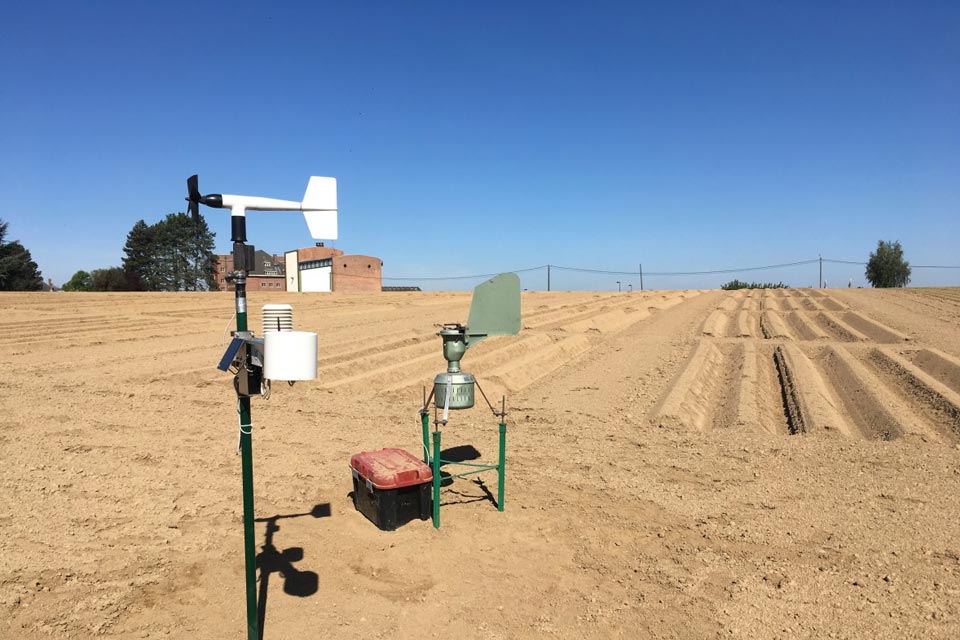Fighting against potato late blight uses large quantities of crop protection products.
Belgian potato production is constantly increasing in response to growing demand. An area of almost 100,000 hectares was cultivated in Belgium during 2023 (source: Fiwap).
Potato growing is the largest consumer of plant protection products (PPP), mainly due to late blight and the naturally occurring agent responsible for this, Phytophthora infestans, its ability to colonise all organs of the plant and its highly significant epidemic potential. It can literally destroy an entire field in a matter of days.
… but scientific advances could reduce this consumption.
Currently, late blight warnings are based on epidemiological and meteorological criteria. Recent advances in molecular detection methods and knowledge of plant-pathogen interactions, combined with the development of precision meteorology, have made it possible to refine the assessment of late blight risk in individual plots.
Aim
The overall aim is to develop a SMART system, a decision support tool (DST), to help potato farmers to control late blight according to the parasite pressure on each plot, based on a strategy adapted to the production method, in organic farming or integrated crop protection.
Setting up this system requires the acquisition of new epidemiological, farming and meteorological data to be implemented in real time. The research programme therefore relies on the following five objectives:
- to quantify the aerial inoculum and map the Phytophthora infestans (Pi) populations present in the environment
- to study the epidemiological features of the typical strains predominantly occurring in Wallonia, particularly how their behaviour varies with the temperature and variety present
- to develop monitoring strategies in order to limit the use of synthetic chemical pesticides and test the resilience of new organic farming systems
- to improve the accuracy of meteorological data to provide warnings for plots, along 3 axes: (1) connecting farming sites to the VigiMAP tool, (2) setting up an automatic data plausibility test and (3) analysing the relevance of farmer weather stations in the spatialisation of data on the Agromet platform.
- to incorporate the improvements into VigiMAP, a decision support tool developed by CARAH that enables Walloon potato farmers to apply fungicide treatments to control blight.
Expected results
The research project aims to develop three additional modules to further improve Vigimap
- “Spores” module. This first module will enable us to target seasonal periods of parasite pressure. It is based on a study of the spatio-temporal profiles of the aerial inoculum of infestans and the viability of the spores.
- “Incubation” module. The aim of this second module is to adapt the prediction of blight development, taking account of the strain/pathogen interactions by studying incubation, latency and sporulation periods of typical strains across a spectrum of varieties.
- “Weather data” module. The aim of this third module is to improve the precision of weather data in order to provide warnings to individual plots, firstly by enabling farmers to use the data from their own sites to create blight simulations, and secondly by integrating farmers' weather data into the km² spatialisation generated on the Agromet platform.
These three modules will enable us to identify risk periods and thereby implement integrated or organic farming control strategies. Adapted phytotechnical approaches will be tested and may serve as new reference bases in the management of potato late blight.
An application designed to encode, centralise and upload the field observation data and laboratory analysis results generated as part of the project is under development. This will be made accessible to all experts in the sector who are in a position to provide data to the relevant databases.
First results obtained
The research carried out in phase 1 enabled us to make several advances, notably:
- development of a biomolecular method using qPCR to detect and quantify the occurrence of infestans inoculum in the air before the plants are infected and symptoms appear
- testing of three types of spores traps and demonstration of the benefits of Burkards sensors and passive sensors
- production of data on (1) aerial inoculum profiles of blight development and (2) meteorological conditions, from 12 trial fields over 3 years, enabling the detection of relationships between variables and the development of epidemiological models
- analysis of the factors taken into account in the epidemiological development models for blight and assessment of the relevance of these factors for the development of new models
- description and monitoring of the evolution of infestans strains in the Walloon Region
- development of protocols for determining the distinctive features of strain interactions in potato variety infestans
- testing of treatment protocols for the control of late blight in integrated agriculture and organic farming
- functional analysis of computer tools for the encoding, centralisation and online posting of field data for the observation of late blight and data obtained from analysis using laboratory spore traps.
Partners
- UCLouvain: Anne Legrève, Gil Colau, Vivien Le Vourch
- FIWAP: Pierre Lebrun
Funding
- SPW Agriculture, Ressources naturelles et Environnement - Recherche






